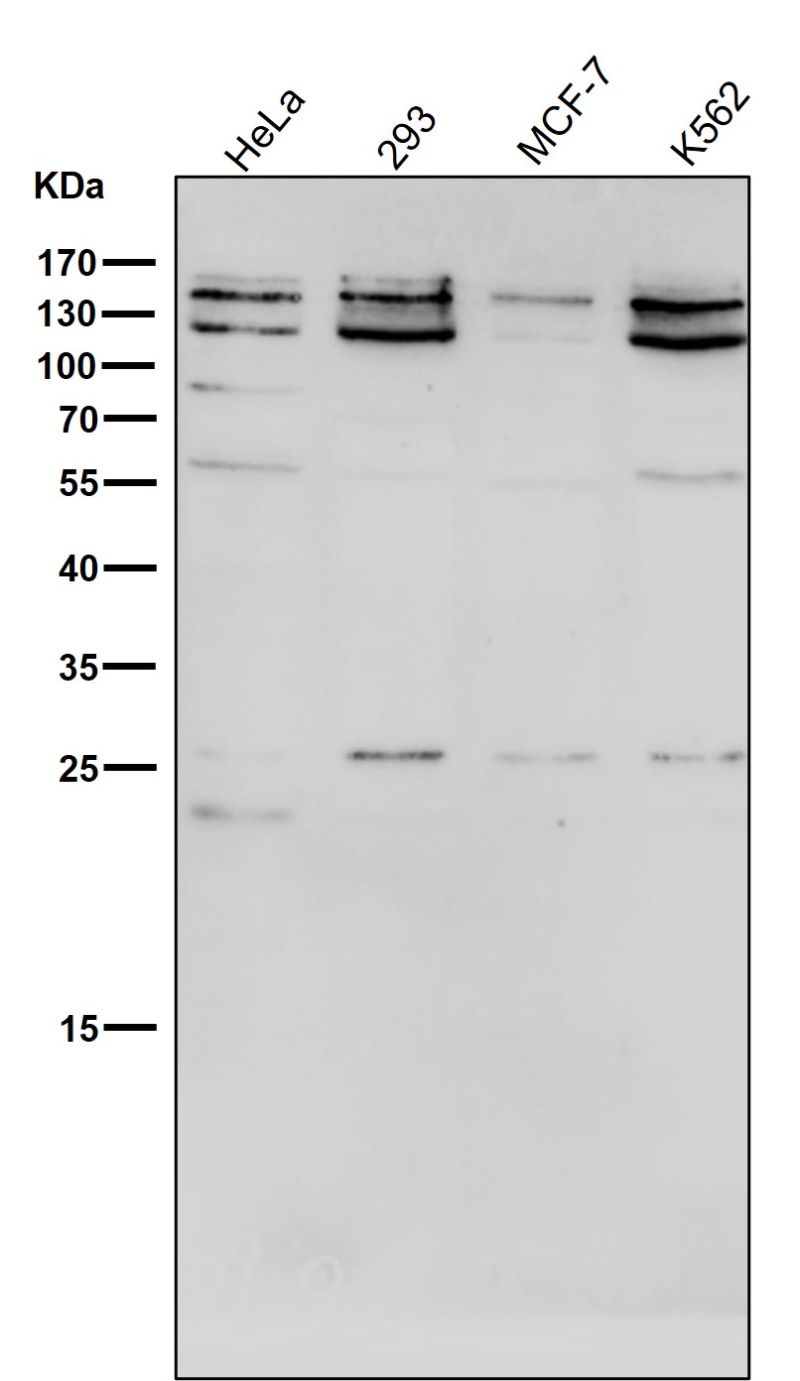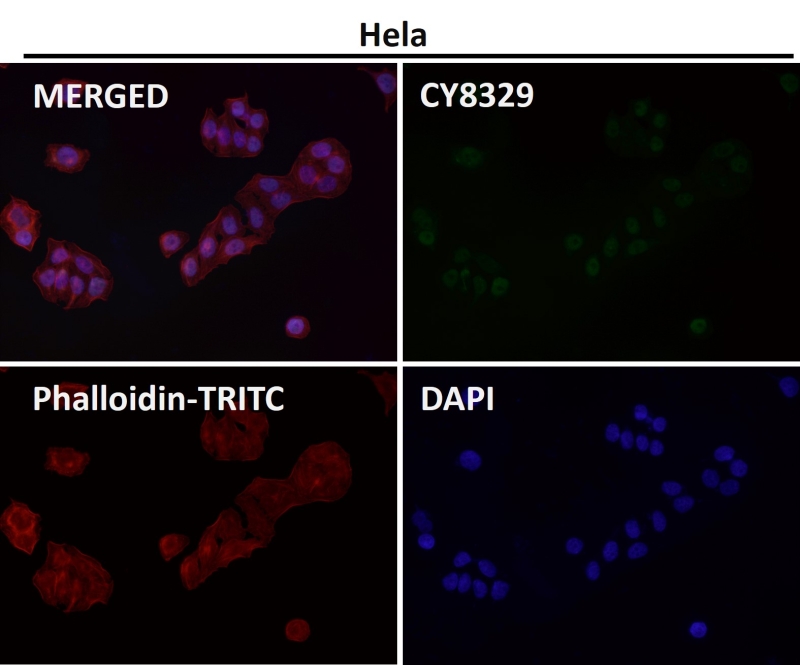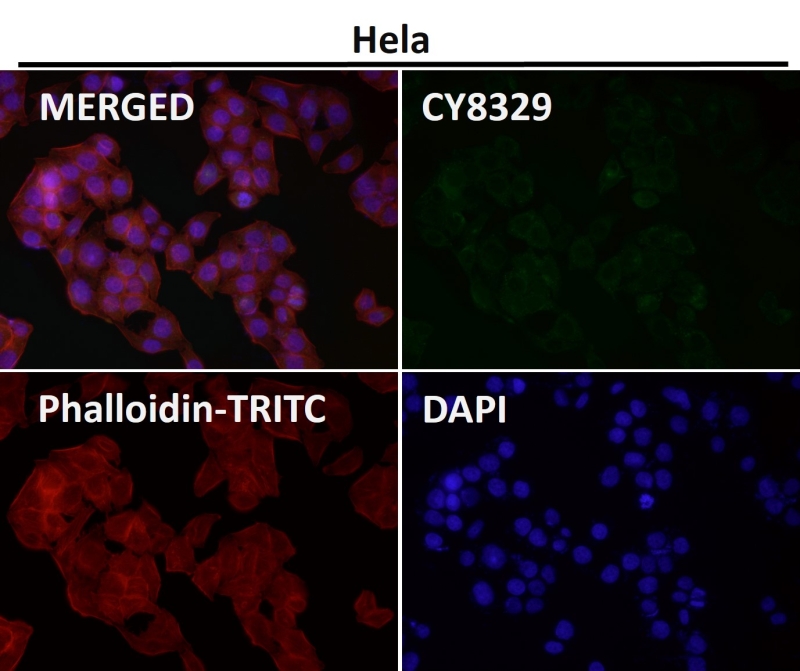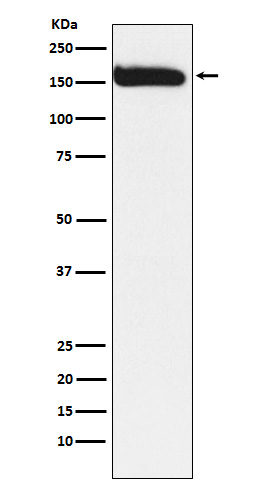



| WB | 1/1000-1/2000 | Human,Mouse,Rat |
| IF | 1/20-1/50 | Human,Mouse,Rat |
| IHC | IHC:1/100-1/200;IHF:1/50-1/200 | Human,Mouse,Rat |
| ICC | 1/50-1/200 | Human,Mouse,Rat |
| FCM | 咨询技术 | Human,Mouse,Rat |
| Elisa | 咨询技术 | Human,Mouse,Rat |
| Aliases | bHLHe74; mNRC 1; NCoA 1; RIP160; SRC 1;;KAT13A |
| WB Predicted band size | 157 kDa |
| Host/Isotype | Rabbit IgG |
| Antibody Type | Primary antibody |
| Storage | Store at 4°C short term. Aliquot and store at -20°C long term. Avoid freeze/thaw cycles. |
| Species Reactivity | Human |
| Immunogen | A synthesized peptide derived from human KAT13A |
| Formulation | Purified antibody in PBS with 0.05% sodium azide,0.05% BSA and 50% glycerol. |
+ +
以下是关于 **KAT13A/SRC1抗体** 的3篇文献及其简要摘要:
1. **文献名称**:*Steroid receptor coactivator-1 (SRC1) mediates ligand-independent activation of gene expression*
**作者**:Xu J, Li Q
**摘要**:研究揭示了SRC1(即KAT13A)作为核受体共激活因子的功能,通过其组蛋白乙酰转移酶活性促进染色质重塑,并利用特异性抗体验证了其在雌激素受体信号通路中的关键作用。
2. **文献名称**:*Role of SRC1 in the regulation of metabolic genes by thyroid hormone*
**作者**:Ying H, et al.
**摘要**:通过免疫沉淀和Western blot技术(使用SRC1抗体),研究发现SRC1/KAT13A与甲状腺激素受体结合,调控能量代谢相关基因的表达,揭示其在代谢疾病中的潜在机制。
3. **文献名称**:*SRC1-driven chromatin remodeling promotes breast cancer metastasis*
**作者**:Qin L, et al.
**摘要**:该文献利用KAT13A/SRC1抗体进行免疫组化分析,发现SRC1在乳腺癌中高表达,并通过增强靶基因的转录活性促进肿瘤侵袭和转移,提示其作为治疗靶点的潜力。
4. **文献名称**:*Characterization of the p160 family of coactivators in transcriptional regulation*
**作者**:Torchia J, et al.
**摘要**:研究系统分析了p160家族成员(包括SRC1/KAT13A)的功能差异,通过抗体阻断实验证明SRC1在核受体介导的基因激活中具有独特的时空调控特性。
---
以上文献均围绕SRC1/KAT13A的分子机制或应用展开,涉及基因调控、代谢及癌症领域,抗体多用于功能验证或表达分析。
The KAT13A/SRC1 antibody targets the KAT13A protein, also known as Steroid Receptor Coactivator-1 (SRC-1), a member of the NCOA (nuclear receptor coactivator) family. SRC-1 was first identified as a transcriptional coactivator that enhances ligand-dependent activation of nuclear hormone receptors, including estrogen, progesterone, and thyroid hormone receptors. It functions by recruiting histone acetyltransferases (HATs) like p300/CBP and members of the ACAT family to modify chromatin structure, facilitating transcriptional activation. KAT13A/SRC1 is critical in regulating gene expression linked to metabolism, development, and hormone-responsive pathways.
Antibodies against KAT13A/SRC1 are widely used in research to study its role in transcriptional regulation, epigenetic modifications, and disease mechanisms. For example, SRC-1 overexpression has been implicated in hormone-dependent cancers (e.g., breast and prostate cancer) and metabolic disorders. These antibodies enable detection of protein expression, localization (e.g., nuclear vs. cytoplasmic shifts), and interaction partners via techniques like Western blotting, immunohistochemistry, and co-immunoprecipitation. Structural studies using these antibodies have also clarified its modular domains, including bHLH-PAS, receptor interaction motifs, and HAT-binding regions. As a key player in the ACAT/HAT complex, SRC-1 remains a focus for understanding crosstalk between signaling pathways and chromatin remodeling, with therapeutic implications for targeting coactivators in disease.
×